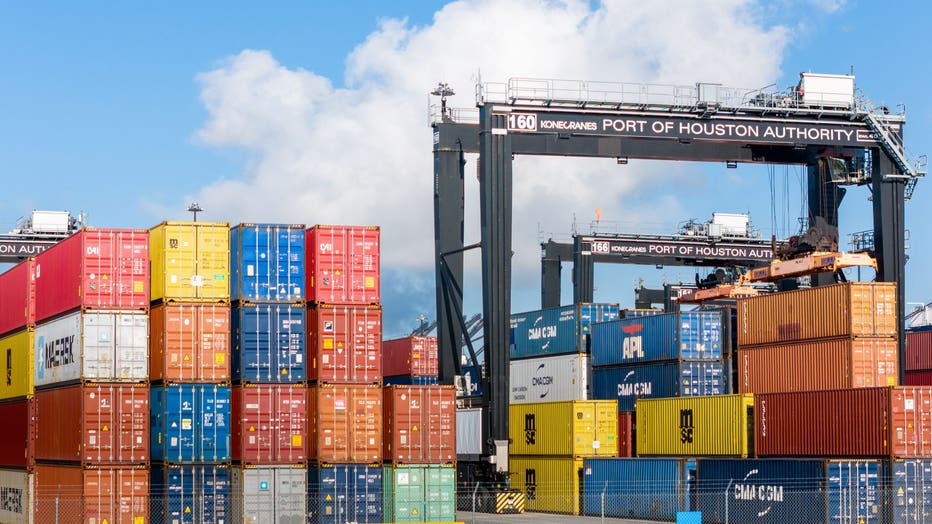Port strike looming: What to know and expect
A strike involving port workers along the East Coast is looming this week as the time ticks by for a labor deal to be reached.
If a deal isn’t reached by the end of the day Monday, thousands of dockworkers could begin striking Tuesday, Oct. 1, potentially putting a massive economic strain on retailers before the peak holiday shopping season.
Here is what to know about the labor dispute and effects of the potential strike:
Labor dispute
Unionized dockworkers in the International Longshoremen's Association (ILA), which represents 45,000 members at East Coast and Gulf Coast ports, may go on strike beginning Tuesday, Oct. 1 if an agreement isn't reached by the end of Monday.
If a deal isn’t reached, 36 ports stretching from Maine to Texas are at risk of shutting down.
Much of the labor dispute involves the addition of new technologies to U.S. ports that the workers say could ultimately cause job losses.The union is demanding a total ban on the automation of cranes, gates and moving containers in the loading and unloading of freight, along with significantly higher wages.
West Coast dockworkers belong to a different union and aren't involved in the strike.
The U.S. Maritime Alliance, which represents shippers and ports, and the ILA haven’t met since June, and no talks are scheduled, according to The Associated Press.
"ILA unity remains strong and is growing," James McNamara, spokesman for the International Longshoremen’s Association, said in a statement Sunday. He said the union would update the public on any new developments by 11 a.m. Monday.
What would happen if port workers strike?

FILE - In an aerial view, shipping containers are seen at the Port of Houston Authority on September 20, 2024 in Harris County, Texas. (Photo by Brandon Bell/Getty Images)
If the dockworkers were to strike, operations at 36 U.S. docks would be affected, which would severely limit the number of goods coming in and out of the country.
Retailers would begin to feel the effects first and, depending on the length of the strike, consumers could certainly begin to see the effects themselves while out shopping.
Big picture
The potential strike would impact nearly half of all containers moving through U.S. ports and include five of the 10 busiest ports in North America, reported The Maritime Executive, a maritime industry magazine and newsletter.
"Everyone from the shipping lines to trade groups and maritime industry analysts also warns of widespread ramifications in the global supply chain. Sea-Intelligence has estimated that for each day of a strike, it would take four to six days to clear the backlog. They wrote that even a two-week strike could have ramifications into 2025," Maritime Executive’s report continued.
FOX Business reported that JP Morgan issued an estimate that a strike would cost the U.S. economy as much as $5 billion a day.
President Joe Biden's team does not see a potential strike as necessarily disruptive to the economy in the short term, since retail inventories have increased as companies planned for the contract dispute, FOX Business reported.
The federal government also has additional tools to monitor supply chains that it lacked during the COVID-19 pandemic when long wait times at ports and higher shipping costs pushed up inflation.
Some companies that rely on the at-risk ports have been importing early or rerouting their goods to the West Coast, Reuters reported.
At the stores
Several experts told FOX Business that this type of disruption in shipping and supply chains often leads to product shortages, which drives up prices.
Discretionary products, particularly luxury items and recreational goods, are expected to be most affected due to their high price elasticity, SalSon Logistics CEO Jason Fisk told FOX Business.
Some goods could also arrive too late for the peak of the holiday shopping season.
White House intervention
Top Biden administration officials met Friday with port operators ahead of the possible strike to encourage negotiations, according to a White House official who spoke anonymously with the Associated Press.
Presidents have the authority to intervene in labor disputes that pose a threat to national security or safety. Under the Taft-Hartley Act, Biden could seek a court order to suspend the strike for an 80-day cooling-off period. Robyn Patterson, a White House spokesperson, said in a statement that the administration has never invoked the act and isn't considering it now.
Biden has been urged by the National Retail Federation and 177 trade groups representing retailers, manufacturers, farmers, automakers and truckers to facilitate negotiations and step in to prevent disruptions.

